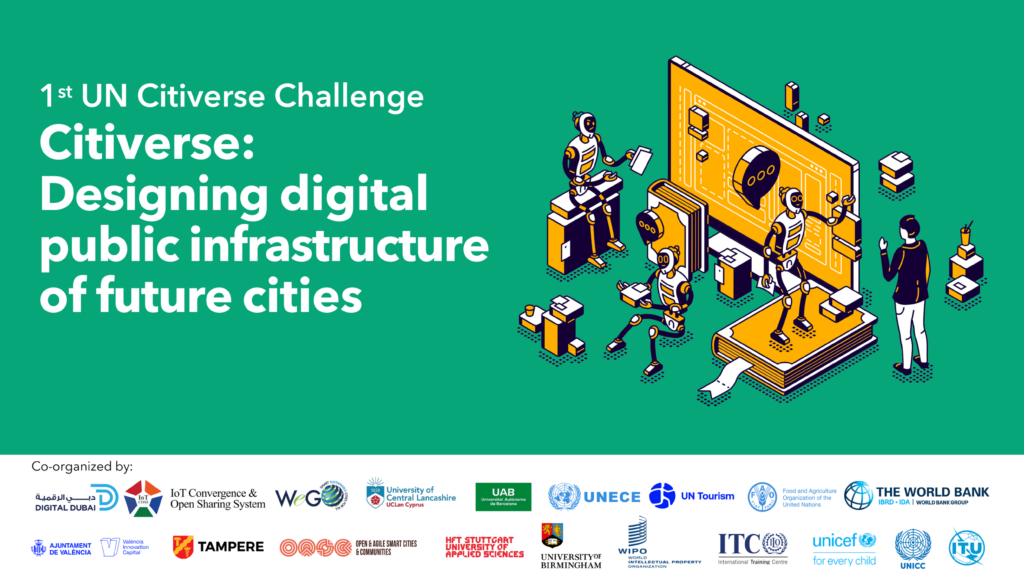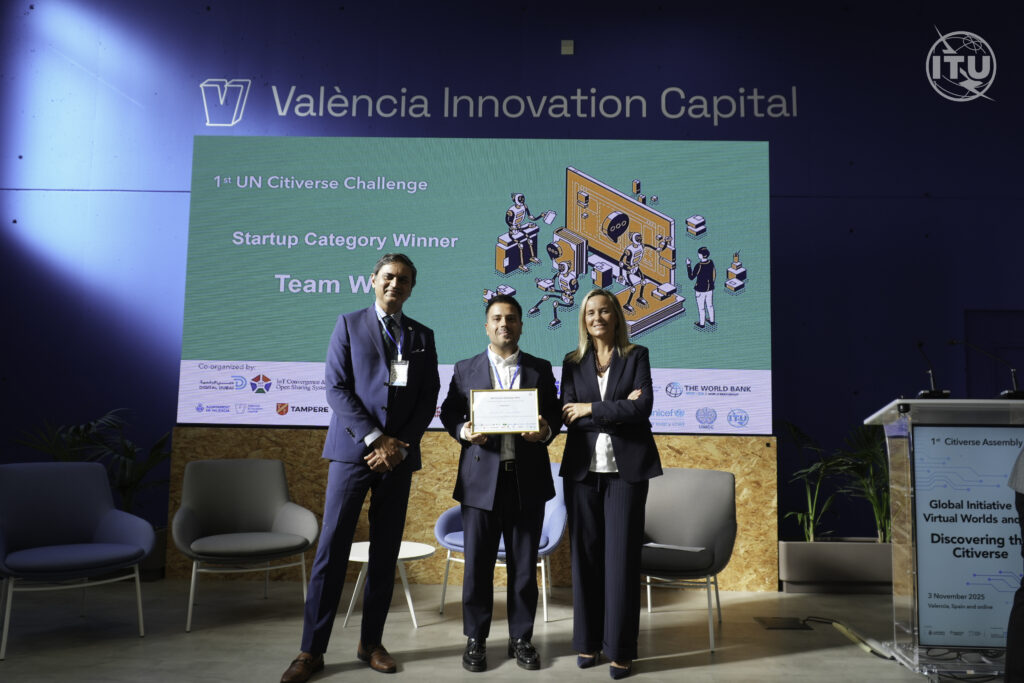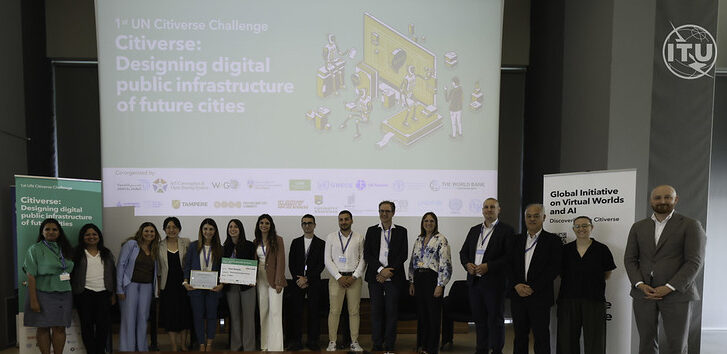1st UN Citiverse Challenge

The 1st UN Citiverse Challenge is co-organized by ITU, UNICC, ITCILO, WIPO, FAO, the World Bank Group, UN Tourism, UNICEF, UNECE, Digital Dubai, OASC, World Smart Sustainable Cities Organization, City of Tampere, City of Valencia, University of Birmingham, Universitat Autònoma de Barcelona, University of Central Lancashire, Cyprus, HFT Stuttgart University of Applied Sciences and University for IoT Convergence & Open Sharing. It invites students and startups to design digital public infrastructure solutions using AI-powered virtual worlds, aligned with the Pact for the Future and the Global Digital Compact.
The challenge is built around three problem statements: access to public services, sustainability and resilience, and tourism and digital culture.
Contact us at virtualworlds@itu.int.
Latest Updates
Startup Category – Completed
The Startup Category is now in full swing, with the pre-selected teams announced.

- 4 September 2025 – Project presentation during a webinar. Check out the webinar here.
- Congratulations to Team WEO, winner of the Startup Category, announced during the 1st Citiverse Assembly on 3 November 2025 in Valencia, for their pioneering work advancing urban resilience and adaptation through AI-powered virtual worlds.
Student Category – Completed
The Student Category of the Challenge concluded successfully with outstanding participation from global teams.

The winning team was awarded at the 2nd UN Virtual Worlds Day in June 2025, Turin, Italy.
Congratulations to Team DataLab, winner of the student category, for their outstanding contribution!
Possible Output: Startups

Reports
Description of your solutions that can be implemented at a city or national level, focusing on how startups can help transform digital public infrastructure using the citiverse.

Functional Prototypes
Functional prototypes using advanced technologies such as AI, metaverse platforms, gaussian splatting, digital twins, and open-source tools to address specific challenges in the citiverse listed in the problem statements.
Possible Output: Students

Research Papers
Research papers or reports that provide evidence-based insights, use cases, and recommendations for how digital public infrastructure can be implemented and scaled in the citiverse, addressing issues like equity, sustainability, and resilience.

Prototypes
Working prototypes demonstrating how digital public infrastructure can be integrated into the citiverse to solve global challenges listed in the problem statements.

Cultural Experience Designs
Designs for immersive cultural experiences in the citiverse, focusing on the digital preservation of cultural heritage, enhancing accessibility to cultural assets, and promoting inclusive tourism in the citiverse.

Community Engagement Initiatives
Propose initiatives or campaigns that encourage partnerships between governments, businesses, and communities to develop and scale digital public infrastructure solutions in the citiverse to mitigate the real world challenges.
Mentore, Jurors and Award Panel

Prominent team mentors, jurors and award panel from academia, the diplomatic community and the UN family.
Evaluation criteria
Evaluation criteria 1:
Innovation
1. Assess the creativity and originality of solutions presented, focusing on the design of virtual simulations, enhancing the brainstorming process beyond traditional methods.
2. Evaluate the extent to which participants push the boundaries within the metaverse to address challenges and propose solutions.
Evaluation criteria 2:
Relevance to the Sustainable Development Goals
3. Examine the alignment of proposed solutions with the UN Sustainable Development Goals, emphasizing the incorporation of the metaverse to tackle critical global challenges.
4. Consider how effectively the solutions leverage technology to promote sustainability and social impact within urban and rural communities.
Evaluation criteria 3:
Scalability and Sustainability
5. Analyze the scalability and sustainability of proposed projects, looking for a clear framework outlining how solutions will be expanded and maintained beyond the event.
6. Evaluate the feasibility of partnerships, funding models, policies, and integration strategies to ensure long-term impact and continuity.
Evaluation criteria 4:
Impact
7. Assess the potential impact of proposed solutions on communities, economies and the environment, considering both short-term and longer-term effects.
8. Look for evidence of tangible benefits and measurable outcomes that demonstrate the transformative power of the citiverse in addressing societal challenges.
Evaluation criteria 5:
Implementation Feasibility
9. Evaluate the technical execution of proposed solutions, focusing on the feasibility of implementing virtual environments within the metaverse. Evaluate the replicability, impact and relevance to real communities.
10. Consider factors such as accessibility, infrastructure and platform requirements, that will facilitate the implementation of the project.
Prizes

Exciting prizes await the most innovative and impactful solutions! The winning individual or team will receive recognition for their creativity and ingenuity and also receive a cash prize.
Students Category: CHF 5,000 for the winning team or individual.
Startups Category: CHF 5,000 for the most scalable and impactful solution.